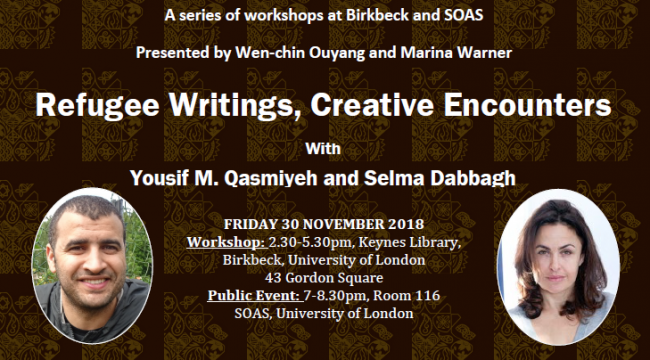Poetics of Exile: the “Ruins” of Homeland

In this blog post, Professor Wen-chin Ouyang shares an overview of the workshop Refugee Writings, Creative Encounters which took place at SOAS, University of London in 2018.
Poet Yousif M. Qasmiyeh and fiction writer Selma Dabbagh are two Palestinians who are more interested in writing about their world today than looking back at their or their parents’ Palestinian pasts. Traces of ‘Palestine’ are, however, visible in varying ways in their impeccable English expression. Details of life in a refugee camp in northern Lebanon determine the themes in Qasmiyeh’s poetry, the turn of his phrases, and his contemplations of existential questions, such as the notions of ‘home’ and ‘homeland’ and the role of ‘memory’ and ‘history’ in their construction.
A refugee camp is a microcosm of an imaginary Palestine experienced in a particular intersection between time and place, or history and geography. It in turn produces its own ‘invented traditions’. An abandoned dwelling place takes on gargantuan proportions in nostalgic remembrances of the local Palestinian past as the refugee camp faces material changes, including new waves of Palestinian migration.
The rupture between a parent’s memory of Arab Palestine and a Palestine experienced in the second degree, through the prism of Britain and the English language, is at the heart of Dabbagh’s novel, play and short stories. Exile generates and shapes politics of engagement, which also informs how a Palestinian grown up in exile relates to the Palestinian homeland and other Palestinians.
In Qasmiyeh and Dabbagh’s poetics, Palestine, the homeland, is a place mapped by ruins, or traces of earlier habitation, reminiscent of the atlal motif in pre-Islamic Arabic qasida. ‘Ruins of the abode’ is a necessary prelude to a classical Arabic ode, and here it can provide a blueprint for reading contemporary Palestinian writings. The lyrics of Umm Kulthum’s famous song, al-Atlal, written by Ibrahim Nagi and adapted by Ahmed Rami, shows the Palimsestine texture of nostalgia and the language of remembering and, above all, the multilingual fabric of Qasmiyeh and Debbagh’s English. Traces of the Arabic language, like the fragments of the abode in ruins, saturate their English expressions and memories of Palestine.
Wen-chin Ouyang is Professor of Arabic and Comparative Literature at SOAS, University of London and leads our 5th strand: World Literatures.
Workshop poster:

Where next?
Poetry in Translation, Poetics of Translation